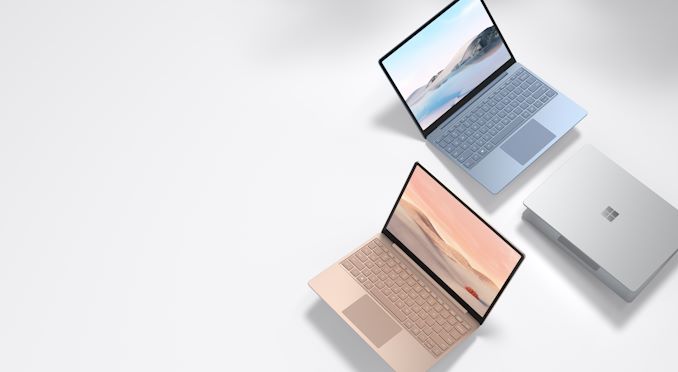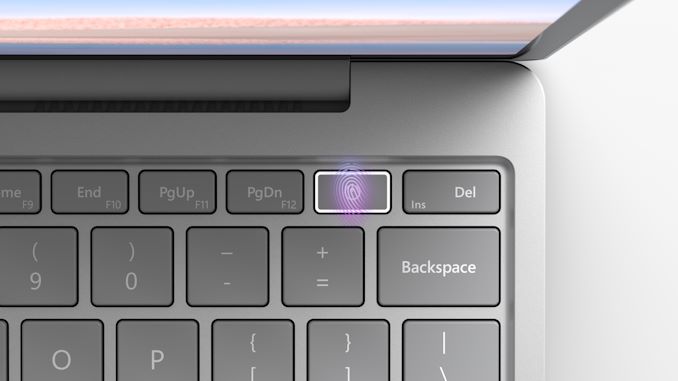Microsoft Launches the Surface Laptop Go: Lighter In The Hand And The Wallet
by Brett Howse on October 1, 2020 9:01 AM EST
Microsoft’s Surface lineup started with a Surface RT tablet, but is now features a wide range of devices targeting different markets, with different price brackets, and different levels of performance, but Microsoft is more often than not aiming for the higher end of the price range with the Surface lineup. This has kept their products out of reach for a lot of consumers. Today the company is announcing the Surface Laptop Go, broadening the laptop audience considerably with an entry point of just $549 USD.
Microsoft’s Surface Laptop 3 is a competent device, with two device sizes at 13.5 and 15-inches, featuring an all-aluminum chassis, and the 3:2 PixelSense display which is one of the highlights of any Surface device. But with an entry price of $999, there is a large part of the market that has been left vacant by Microsoft, until today.
| Microsoft Surface Laptop | |||||
| Component | Laptop Go | ||||
| CPU | Intel Core i5-1035G1 4C / 8T 1.0-3.6 GHz Gen 10 Graphics with 32 Eus 15W TDP |
||||
| Memory | 4 / 8 GB LPDDR4x 16 GB LPDDR4x Available on Commercial Model |
||||
| Display | 12.45-inch PixelSense 1536 x 1024 Resolution 148 PPI 3:2 Aspect Ratio 10-Point multitouch |
||||
| Storage | 64 GB eMMC 128 GB or 256 GB SSDs |
||||
| Wireless | Wi-Fi 6 Bluetooth 5.0 |
||||
| I/O | 1 x USB Type-C 1 x USB Type-A Headset jack Surface Connect |
||||
| Webcam | 720p f2.0 | ||||
| Battery | Up to 13 hours 39-Watt adapter |
||||
| Dimensions | 278 x 206 x 15.7 mm 10.95 x 8.10 x 0.62 inches |
||||
| Weight | 1110 grams 2.45 lbs |
||||
| Starting Price (USD) | $549 | ||||
| Availability | Preorder Now, Available Oct 13 | ||||
The Surface Laptop Go offers up a 12.4-inch PixelSense touchscreen display, making the device a bit smaller than the Laptop 3, and it weighs a bit less as well, at 2.45 lbs. The display does lose some sharpness compared to the Laptop 3 though, with a 1536 x 1024 3:2 resolution, which is only 148 pixels-per-inch. That is a steep decline compared to the Laptop 3 with its 200 pixels-per-inch display. Microsoft does color-calibrate all of its displays to sRGB, so despite the lesser display than its Surface brethren, it should still be a step ahead of most of the displays in this price range.
Unlike the Surface Go 2, the Surface Laptop Go avoids the Y-Series processors and packs in a proper 15-Watt Intel Core i5-1035G1 processor, meaning four cores and eight threads based on Intel’s Ice Lake platform. If you feel it is a bit odd to see a 10th Generation Intel processor being announced in a new device when all of the 11th gen products are just being announced, you are right. But, Microsoft has had a tendency to release at their own cadence, rather than follow the annual product updates from Intel. Still, the Core i5-1035G1 is a great pick for this class of device. Ice Lake also means the Laptop Go gets Wi-Fi 6, thanks to Intel’s AX201.
What is not so great is the baseline offering in terms of memory and storage, with the $549 entry-level device offering just 4 GB of RAM and 64 GB of eMMC storage. This is unacceptable for a 2020 laptop. Microsoft can be difficult to figure out, as they want to offer premium products, but then offer configurations which are going to make the people who purchase them not enjoy them. It would have been best to see this configuration skipped entirely, as it should not be purchased. The Laptop Go will be offered with 8 GB of LPDDR4x, and even 16 GB on the commercial variant, with 128 GB and 256 GB SSD options.
Microsoft rates the new laptop at up to 13 hours of battery life with typical device usage – no longer do they rate their devices based on local video playback. It also offers a fast-charge with 80% battery life in just an hour of charging.
Although the device is small, Microsoft has managed to include a proper keyboard, and the Surface keyboards are generally some of the best around, so hopefully the Laptop Go continues that trend. It features 1.3 mm of travel, and offers backlighting, which is not always a given at this starting price. The glass trackpad which is 115 mm x 77 mm should be a nice step up from other laptops in this class, which generally feature plastic trackpads of mediocre quality.
Sadly this will be the first Surface product to not feature an IR camera since the Windows Hello-based facial recognition was first added back on the Surface Pro 4. Instead, Microsoft is including a fingerprint reader on the Power button, except on the base model, which gets no biometric support. The camera is a 720p f2.0.
It will also be the first Surface device to not offer an all-metal design. The Laptop Go will have an aluminum top mated to a polycarbonate and fibre resin base, featuring 30% post-consumer recycled content.
Microsoft clearly made some cuts to bring a premium design to the mid-range, but as long as the base model is avoided, the Surface Laptop Go looks to be a nice new entrant. It will be available in three colors with Ice Blue, Sandstone, and Platinum. The new Surface Laptop Go is available for pre-order today, with a launch date of October 13th.
Source: Microsoft












62 Comments
View All Comments
Zagor Te Nay - Monday, October 5, 2020 - link
I guess this is as close as Microsoft is willing to come to premium Chromebook alternative.64GB should be OK for OS, Office suite... maybe a few more apps and all the data in the cloud. 365 laptop. Surface 365?
I still use Surface Pro 3 4GB for tablet needs, I am not to worried about 4GB of RAM for light scenarios. But screen res doesn't sound right. Should be at least 1800x1200, I think.
flashpowered - Tuesday, October 6, 2020 - link
I use my Surface Book docked 99% of the time, and this would be an ideal replacement. I'd want a minimum of 16GB RAM and 512GB SSD, and this is frustratingly close. The only time I use my machine away from my desk is for writing or a bit os sofa websurfing, and I wouldn't need anything more than this.